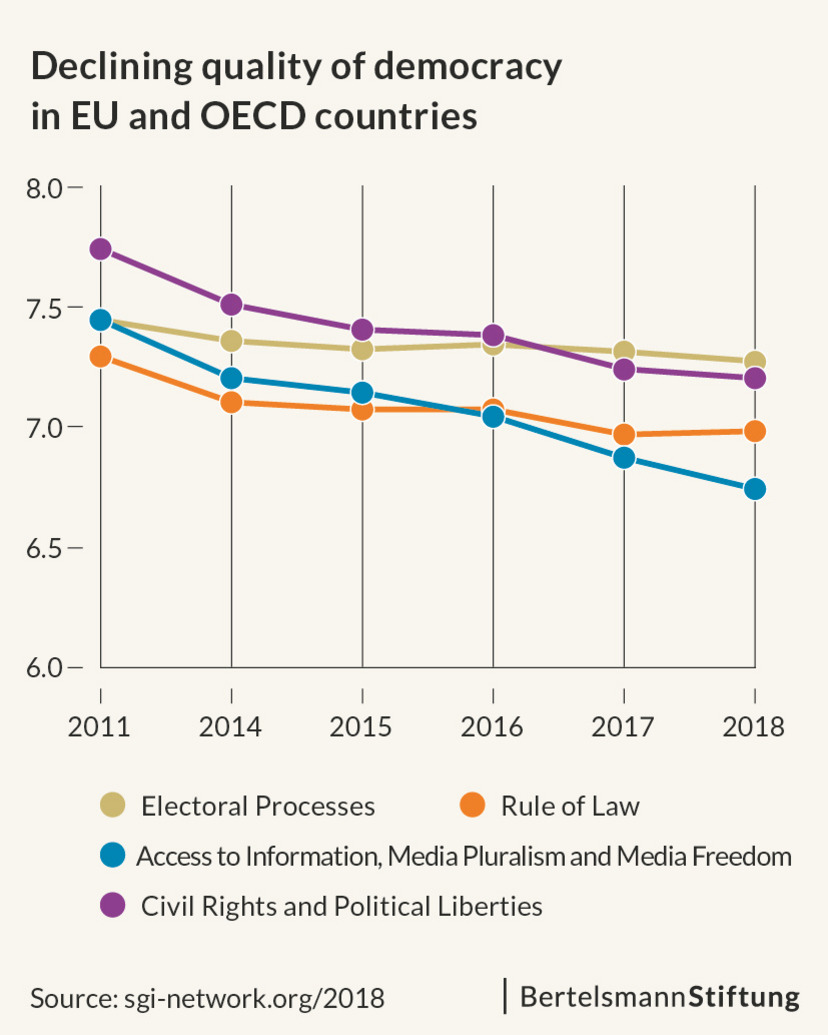The quality of democracy in the OECD and EU has declined in recent years. At the same time, growing political polarization has made the day-to-day work of governance and thus member states' capacity to reform more difficult. Governments in a number of countries such as the United States, Hungary and Turkey are deliberately stoking social tensions rather than seeking consensus in an effort to negotiate forward-thinking solutions – these are the findings of the 2018 Sustainable Governance Indicators (SGI). As a cross-national survey of governance, the SGI examines 41 countries in terms of their democratic standards, quality of governance and policy outcomes in the areas of economics, social affairs and the environment. We have used the index regularly since 2011 to analyze the future viability of OECD and EU states.

© vege - stock.adobe.com
The quality of democracy is declining in many industrialized states
Globalization, social inequality and climate protection – given the enormous challenges facing OECD and EU countries, more vigorous reforms should be expected. Yet as our findings show, eroding standards of democracy and growing political polarization are hampering the implementation of sustainable reforms.
"Governments must find formulas to effectively combat increasing polarization. If they want to counter political apathy, they should offer solutions designed to ensure long-term success and resolve rather than reinforce lines of conflict."
Aart De Geus, Chairman Executive Board Bertelsmann Stiftung
All the more worrying is the trend pointed to by the study's authors: in parallel with the decline in democratic standards, many countries are losing ground with regard to key aspects of "good governance." As a result, the problem-solving capacities of OECD and EU states have fallen on average in recent years.
Democratic standards on the decline in 26 of 41 countries
With regard to governance and the quality of policy outcomes, the Nordic countries, Switzerland and Germany continue to receive the highest marks. Here too, however, partisan polarization is on the rise and undermining future-oriented reforms. Overall, 26 countries show a decline in democratic and constitutional standards since the 2014 SGI. Particularly negative developments can be observed in countries like Hungary, Poland, Mexico and Turkey – but also in the United States. The world's largest national economy slid nine places in matters of democracy and quality of governance, while Poland plummeted 29 places in terms of democratic standards. "The model of liberal democracy is also coming under increasing pressure in the OECD and the EU," explains Daniel Schraad-Tischler, senior analyst and co-author of the study. "In some countries, central democratic and constitutional standards – freedom of the media, for example – are already heavily damaged."
It is also alarming, he emphasizes, that despite the declining quality in democracy, citizens' trust in government has actually increased in countries like Poland, Hungary and Turkey. "This development illustrates that, in these countries, fundamental democratic values don't seem to be sufficiently anchored in the political consciousness of a large part of the population," Schraad-Tischler says.
Non-stop campaigning rather than governing
Party-political polarization between "the left" and "the right" has increased in almost all countries. Populist parties are further intensifying this trend in many national legislatures. The authors criticize some governments for their role in hardening, rather than softening or breaking down, lines of conflict in society. Related to this, the report states, is the fact that many governments are increasingly less inclined to engage in the broad-based consultation of societal actors during the planning phase of reforms. Eighteen countries – including the United States, Poland and Hungary, but also countries like Iceland and the Czech Republic – have performed more poorly in this area, some significantly so, since the 2011 and 2014 SGI. Only ten countries, including South Korea, Ireland and Malta have actually improved here. Some governments, such as those in Hungary, Poland, or Turkey, are deliberately circumventing legally established consultation procedures or excluding key actors in the process. Along with the narrowed scope of stakeholder inclusion, governments' communication abilities and implementation efficiency are also on the decline. "In many countries, we're witnessing a kind of permanent election campaign," elaborates Schraad-Tischler. "Governments no longer manage to communicate their objectives coherently or build a consensus around the facts. In the end, the implementation and quality of long-term political solutions suffer."
Given the pressing political challenges, this diminished capacity to solve problems weighs heavily on these states: "Despite economic stabilization since the financial crisis, social inclusion in many OECD and EU countries – especially in the hard-hit Southern European countries – hasn't yet returned to prior levels," says Schraad-Tischler. "In the face of weak R&D investment, or the absence of efforts to address demographic change, we're also seeing numerous political and economic problem areas in which progress is often too slow."
Order our abstract here.
All country reports and data are freely accessible here.
The Sustainable Governance Indicators examine how sustainable policy outcomes are achieved and how politics can more effectively target long-term objectives. Drawing on a comprehensive set of 140 indicators designed to capture various aspects of governance and democracy, the SGI surveys 41 OECD and EU countries in terms of their governance performance. As an instrument of cross-national comparison, the SGI identifies examples of policy innovation and sustainable governance. The instrument is comprised of three pillars: the Policy Performance Index, the Democracy Index, and the Governance Index.
Please find further information on the website of the SGI.






